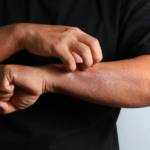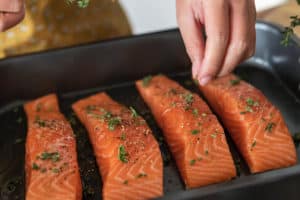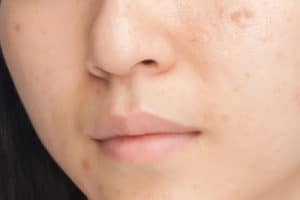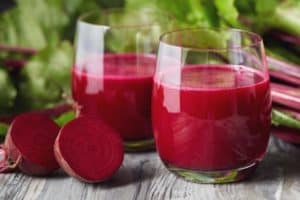One of the best things you can do to improve your skin is to include foods in your diet that help produce collagen. I ignored the benefit of collagen-boosting foods for a long time until I started learning about their benefits.
What foods help produce collagen? Here are 7 foods that will naturally promote collagen and give you healthier skin:
- Coconut Oil
- Avocado
- Salmon
- Bone Broth
- Mushrooms
- Sea Vegetables
- Oranges
All of these foods are on your side in the battle for better-looking skin. What specific foods should you eat? How do these foods benefit your skin exactly? Read on to learn more about these foods that help produce collagen and their other benefits.
What Foods Help Produce Collagen?
1. Coconut Oil
Yes, polyunsaturated fats (Omega 3s) and Monounsaturated fats are known to be good fats. But the taboo “evil” saturated fats are also, in moderation of course, important for your health and are some of the best foods that help to produce collagen.
Saturated fats are taboo because of years of misinformation telling people fats are bad. Saturated fats come in medium and short-chain fatty acids, which are great for the gut. Short-chain fatty acids are found in butter and in an even more concentrated source in ghee, which is clarified butter. Ghee is a powerful food and remedy that is consumed throughout India and around the world.
Medium-chain fatty acids are found in coconut oil and palm oil. If you’re lactose intolerant or sensitive to dairy, coconut oil or palm oil are excellent alternatives for these beneficial fatty acids. Red palm oil also has vitamin E, which is great for the skin in helping with its glow and youthfulness. Coconut oil and red palm oil really became taboo fifty or so years ago when the myth that saturated fat causes heart disease was out there.
Well, guess what? Saturated fat might actually help your heart; in fact, we believe it does, so you want saturated fats in your diet. When shopping for coconut oil or palm oil, look for organic, virgin, or unprocessed only. For butter, you want grass-fed and organic to avoid any risk of harmful trace pesticides.
2. Avocado
Monounsaturated fats (MUFAs) are found in olives, olive oil, macadamia nuts, sesame seeds, peanuts, and avocados. Consuming monounsaturated fatty acids may help lower your risk of heart disease and keep your skin looking vibrant and well-hydrated.
MUFAs may lower your total and low-density lipoprotein (LDL) cholesterol levels (bad cholesterol) but will keep your high-density lipoprotein (HDL) cholesterol level (good cholesterol).
But don’t consume too much, of course. All fats, including MUFAs, are high in calories, so use MUFAs only in moderation. And try to consume MUFA-rich foods instead of other fatty foods, not in addition to them.
See the below video for other foods that boost collagen:
3. Salmon
Then we have two types of omega 3s:
- Omega 3s from fatty fish, in particular, salmon, herring, mackerel, sardines, and fatty tuna; and,
- Omega 3s from walnuts, chia seeds, flax seeds, and their oils.
You can take supplements, of course, that have EPA and DHA. Perhaps my favorite source of fats because it has phospholipids, squalene, and many other fatty acid components is caviar or fish roe.
Oh yea, it’s not just for the wealthy, caviar is fairly affordable when you buy it from the right places and it’s really really beneficial. It’s a little high on sodium, but if you can get either salmon roe or any type of caviar with no preservatives and colors, it not only gives you omega-3 fats, it also gives you vitamin E, vitamin D, and phospholipids which help drive the fats into your system and is amazing for your skin.
4. Bone Broth
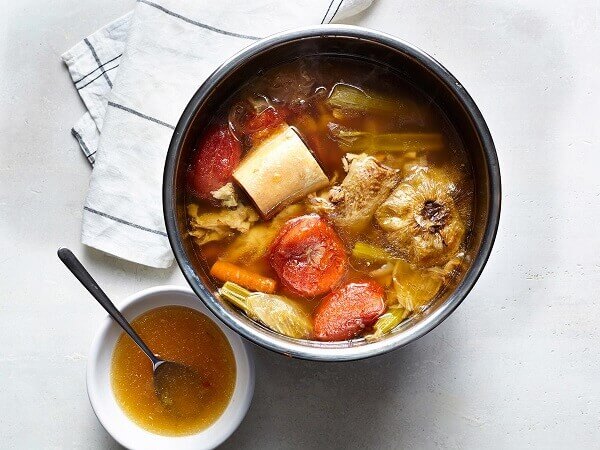
When asking what foods produce help produce collagen and elastin, perhaps the most obvious answer is foods that are collagen-rich, for example, bone broth. It is the quintessential beauty product. If you want great health, there’s a handful of foods and compounds that are ancient yet need to be super modern. This includes fermented foods, bone broth, fish roe, and caviar. Those are amazing, but particularly bone broth.
When eating chicken, choose certified organic chicken. The skin is my favorite part. That’s where the hyaluronic acid and other collagen-boosting compounds are found. So even if you’re not simply making broth, you can consume the skin.
When cooking meat, people always throw away what they think is the fat, the liquid at the bottom of the pan or pot. But that liquid is the collagen-rich broth that contains immune-supportive energizing supplements, particularly amino acids.
Bone broth is also packed with proline and glycine. These are the building blocks of collagen that support healthy tissues. Bone broth is also high in glucosamine, chondroitin, and hyaluronic acid. All of these not only support the joints and the gut but also protect the skin as well.
5. Mushrooms
Another food that has anti-aging benefits is mushroom, both culinary and medicinal.
The Chaga mushroom is amazing. Most of the medical research on Chaga has been done in Russia, where the mushroom grows in abundance, as it prefers cold climate forests.
Chaga has the capacity to stimulate the immune response, reduce inflammation, and multitask on so many levels making it a very powerful adaptogen for the body. It is like a natural alternative to pharmaceuticals. Chaga is anti-inflammatory, relieves pain and purifies the blood and protects the liver. It is an amazing polypore fungus that supports our overall well-being.
Reishi or Ganoderma is a powerful Chinese mushroom that is often referred to as the mushroom of immortality.
Turkey tail mushrooms contain an impressive array of antioxidants, including phenols and flavonoids.
Shiitake has compounds in them that may help fight cancer, boost immunity and support heart health.
Agaricus mushrooms are used to help prevent cancer, type 2 diabetes, high cholesterol, “hardening of the arteries” (arteriosclerosis), ongoing liver disease, bloodstream disorders, and digestive problems.
So mushrooms are a great source not only of immune support but of collagen-building.
Still wondering what foods help produce collagen? See the below video that goes into detail on various collagen boosting foods:
6. Sea Vegetables
Sea vegetables or seaweed have many different components known as polysaccharides that are great for promoting your skin’s collagen growth. They also help with your skin’s elastin production.
Seaweed possesses an electrolytic magnetic action which means it releases excess body fluids from blocked cells. This results in dissipating fatty wastes through the skin pores and thereby shrinking your pores.
Adding seaweed to your diet can also help minimize the development of cellulite on the skin. It does this by purifying it and giving your body a healthy, toned and more vibrant look.
Wakame is my favorite type of seaweed for its skin-improving benefits. It’s commonly found used in miso soup served in Japanese restaurants. Wakame is very high in B vitamins and essential fatty acids, which means it is an excellent food to include in your diet for great skin.
7. Oranges
Last but certainly not least is citrus, which is a big source of vitamin C, should be in anyone’s diet who is wanting great skin. It is said the “C” in vitamin C stands for “collagen” because vitamin C plays a very important role as a building block for your skin’s collagen.
Famously, vitamin C was known as the cure for scurvy. Historically, when sailors began their voyage they had fresh fruits and vegetables on their ship, but because they spoiled so fast, they ate them all right away and then lacked vitamin C for the rest of their long voyages.
Scurvy is characterized by bleeding gums, loose gums, and loose teeth because the collagen has worn down so much. So consuming vitamin C rich foods are vital for keeping your skin’s collagen strong.
Lemon, orange, grapefruit, lime, and tangerine oils are all great additions to your daily diet. Also adding lemon or lime juice and even the citrus peel or zest is wonderful way to produce collagen.
And in case you’re wondering, I did a post on whether you can turn orange from eating too many oranges?
See the below video on how vitamin C from citrus foods and more can boost collagen:
Conclusion – What Foods Help Produce Collagen?
So what foods help produce collagen? 7 foods that produce collagen and elastin in your skin, therefore making it look and feel better, are a follows:
- Coconut oil
- Avocado
- Salmon
- Bone Broth
- Mushrooms
- Sea Vegetables
- Oranges
Related Questions
Do eggs have collagen? Egg collagen is found in the egg white, yolk, and shell. It contains an array of different types of collagen, is rich in proline, glycine, and 18 amino acids. This collagen-rich food helps build muscle and helps the body produce more collagen.
What vegetables have collagen? Vegetables don’t contain collagen, however, they help increase your body’s collagen levels. In addition to sea vegetables and mushrooms listed earlier, these vegetables also help Dark red vegetables (like bell peppers and tomatoes); Dark leafy green vegetables (like spinach and kale), and Orange vegetables (like carrots and sweet potatoes).
What is the best source of collagen? Bovine collagen, which is found in the skin, bones, and muscles of cows, is the best source of collagen. It mostly contains type I and type III collagen, including a wide array of amino acids, glycine, and proline. Runner ups are fish, egg, and poultry collagen.

